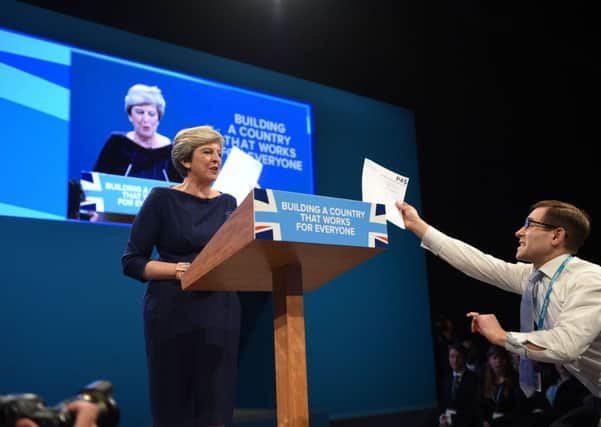Ben Lowry: Prankster did as much damage to Boris as he did to Mrs May


But it is arguable that he inflicted less obvious but ultimately greater damage on Boris Johnson.
A key element of his prank was the notion that he had handed Mrs May her employment notice at the behest of London’s former mayor.
Advertisement
Hide AdAdvertisement
Hide AdNelson then turned and gave Boris thumbs up, the punchline being that he is a disloyal schemer.
This would be an embarrassing implication in any situation, but is devastating in the context of Boris having reportedly already alienated Tory MPs with his shameless manoeuvrings, followed by his ostentatious, almost sarcastic-sounding, protestations of loyalty to Mrs May.
Prior to the prime minister’s keynote address to the Tory conference on Wednesday, it seemed to me that if it went well she should then move to sack the first minister who flagrantly stepped out of line.
The 1922 Committee of Tory MPs was reported to have been willing to endorse a sacking if necessary. Mrs May could even have been candid in her reasoning, and said: “Look, I know my position is weak after the election disaster but I cannot run a government, let alone negotiate Brexit, if I do not have the clear outward support of all my ministers.”
Advertisement
Hide AdAdvertisement
Hide AdSuch a move might have ended her career but it might also have restored faith in her and secured her premiership for a few more years.
Then events intervened: the prankster, the coughing fit and the lettering falling off the stage backdrop behind her.
I wonder if the coughing was made worse by the prank. It became noticeable after that humiliation. She had been ill prior to the speech, but her body might have lost its ability to suppress that once she lost her nerve.
Regardless of the exact reason why her cough worsened, Mrs May cannot feasibly sack a minister now that her position has been weakened even further than it was on Wednesday morning.
Advertisement
Hide AdAdvertisement
Hide AdEven so, I am one of the dwindling number of people who still thinks she should stay on.
Her shortcomings have become painfully apparent since April but have been greatly exaggerated, particularly by observers who do not care for her politics.
There does not seem to be anyone who is more suited to Downing Street just now. Not many politicians could navigate six years at the helm of the Home Office, as she did.
The Tories could find someone who seems at first glance a better leader but quickly proves a disaster.
Advertisement
Hide AdAdvertisement
Hide AdIf global events have taught us anything in recent decades they have taught us that very few people possess the strange mix of abilities and qualities that are needed to run large and complex organisations – and there is nothing more large and complex than a rich nation.
As the British government staggers on, the delighted EU negotiators are slowly turning the screw.
The advice of people such as the former governor of the Bank of England Mervyn King is increasingly pertinent in such chaotic circumstances: that the UK must make clear that it is prepared to crash out of the EU without a deal if the alternative is a bad one.
I think the same thing about unionism, which is not in as good a place as it seemed after the election, now that the government is teetering on the brink of collapse caused by Tory civil war.
Advertisement
Hide AdAdvertisement
Hide AdThe DUP looked so keen to strike a Stormont deal after the March election that it appeared only to embolden Sinn Fein.
It is not as if the DUP was praised for its responsible stance. The great and the good urged ‘both sides’ to compromise, even when SF had red lines and the DUP had none. Gradually it has come to look as if the DUP will not in fact simply fold to those demands (thank goodness).
There are risks for the DUP in holding out, but there comes a point when you have to take such risks (applying a similar logic to the Tory party, Michael Portillo says that while a leadership election is risky for the Conservatives, there is now no alternative).
Unionism across the UK will come under further pressure if the crisis in Catalonia leads to it quitting Spain (a scenario that would be certain to end unhappily, because Madrid would not accept it).
Advertisement
Hide AdAdvertisement
Hide AdBut separatists can overplay their hand. Ruth Davidson’s rise in Scotland was a response to Nicola Sturgeon pushing too far. Sinn Fein might yet have done the same.
• Ben Lowry (@BenLowry2) is News Letter deputy editor